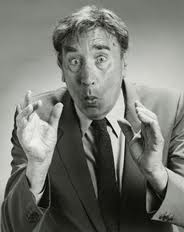 Liverpool Sound and Vision Rating * * * *
Liverpool Sound and Vision Rating * * * *
When Frankie Howerd died in April 1992, the British public lost one of its dearest television and stage stars. Along with Tony Hancock, Sid James, Peter Cook and Dudley Moore, Frankie Howerd was a real superstar of his age and in three separate eras he managed to woo a different generation and grab them by both their funny bones.
When old tapes and recordings that had never seen the light of day suddenly were found in the attics and cupboards of his old home, Channel 4 put together a montage of the comedian’s life and with sensitive narration by Julian Rhind-Tutt, the programme Frankie Howerd: The Lost Tapes explored the man’s work more deeply than had been done before. His work which included two Carry On Films, Up Pompeii and the excellent That Was The Week That Was, has always been kept in some form or another; even possibly the highlight of his career, the edifying talk he gave to the Oxford Union has been much prized for its comedic and artistic flair.
The programme utilised some of the actors and writers who worked alongside Frankie Howerd, including the irreplaceable Ray Galton and Alan Simpson, June Whitfield, Bruce Forsyth and Barry Cryer and what the audience got in return for their 90 minutes was honesty and the undeniable fact that for all his demons and incredible insecurity, he was much loved and needed. There was the beautiful moment when he was asked by Peter Cook to go on stage at the Establishment, Peter Cook and Dudley Moore’s satirical show in London which bought much needed ridicule to a dying Government in the 1960s. When they met years later on This Is Your Life, they reminiscence was too much for the great comedian and viewers were left with a rare sight of seeing him break down in tears. Stunning television!
The only gripe or complaint that any fan of one of the geniuses of British comedy could make about an otherwise excellent and brilliant portrayal of the man was the real lack of input that the newly found tapes had in the overall pantheon of his work. There was the odd ‘never seen before’ snippet here, a facet with the Bee Gees there; but when it came down to it these were largely the barest miniscule on offer. The never seen before Canadian series that he did in the 1970s or the odd photograph and still that would have acted as titillation for those that were thrilled by his comedic delivery.
If these old programmes are ever allowed to see the light of day in their entirety then it would show a 21st century audience that one of the legends of the art of stand-up performances was a master at his art, even when at times he doubted it himself.
Ian D. Hall
